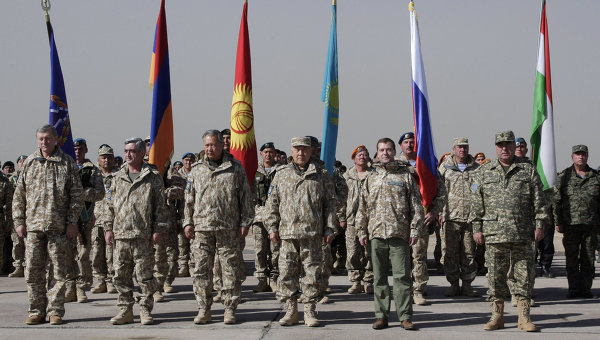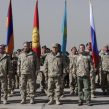
The CSTO: Gendarme of Eurasia
Publication: Eurasia Daily Monitor Volume: 8 Issue: 176
By:

Recent articles in the Eurasia Daily Monitor (EDM) have extensively covered Collective Security Treaty Organization (CSTO) exercises and its decision to work openly to frustrate any manifestation of Arab-Spring like symptoms in Central Asia, including monitoring and using counter-revolutionary actions against the use of the internet for such purposes. But there is more to add to this story. First of all, it is clear that all of the Central Asian states and Russia are much more concerned than they state publicly. In states as disparate as Kazakhstan and Tajikistan we can see a veritable war, or at least serious repression, against any unauthorized form of Islamic preaching or observance. Uzbekistan has just launched its own surrogate version of Facebook. Previously Tashkent and Ashgabat cut off reporting about the Arab Spring. And Moscow was so concerned in April that Deputy Foreign Minister Grigory Karasin told the Duma that Moscow had urged Central Asian governments to make timely reforms to prevent being swept away like Tunisia and Egypt. Russia’s primary goal for the region is stability, both to protect the periphery and to facilitate long-term alliances with Moscow. To that end, Karasin recommended top-down management of civil society, and the establishment of international and inter-religious peace; moreover, he stressed the leaders’ heightened responsibility for raising the population’s standard of living, for developing the educational systems and working with youth (www.duma.gov.ru/news/273/71937/print=yes, April 13). In other words he recommended to the Central Asian governments that they emulate Russia’s post-2000 strategy.
However, they have not listened and continued to strengthen repression and make only cosmetic reforms like increasing pensions in already impoverished Tajikistan while proclaiming the stability of their regimes. Uzbek President Islam Karimov claimed that these revolutions were externally instigated by states who covet resources – though he would not specifically identify them (The Daily Telegraph, May 10). Similarly, Turkmen President Gurbanguly Berdimuhamedov recently said that the abundance of goods in domestic markets – especially food – and cheap prices are key indicators of progress and stability (Turkmen TV Altyn Asyr Channel, April 28).
The Central Asian leaders need only look across the Caspian Sea at Azerbaijan, where domestic unrest has been growing since late 2010. There, President Ilham Aliev has cracked down on alleged Islamist agitation – sometimes blaming Iran – and on domestic dissent. He has constrained the blogosphere and internet communications like Skype, in turn provoking large demonstrations across the country.
In response to this dismissal of Russian concerns, in June President Dmitry Medvedev urged Uzbekistan to coordinate its responses with Moscow (https://eng.kremlin.ru/, June 14). But Tashkent has continued to turn a deaf ear to Moscow. Nonetheless their common fear of the potency of the internet and other social technologies demonstrated in the Arab revolts has led them to adopt a “unified preventive strategy in cyberspace” (Russia Profile, August 16). Additionally, they expanded the mandate of the CSTO’s rapid reaction force to include internal threats to the current regimes. In the words of Colonel Vladimir Popov, a Moscow-based military expert, “the so-called revolutions taking place in the Arab states show that there is practically no way to crush rebellions without the regular army and some crackdown measures” (Nezavisimaya Gazeta, August 31).
As if to drive the point home, Nikolai Bordyuzha, the head of the CSTO, claimed that no state was safe against the export of the “Arab Spring.” He added: “We are talking about the use of CSTO potential in order to protect the constitutional system at the request of a legally elected head of state” (Interfax, September 5). Yet, Uzbekistan still opposes turning the CSTO into a collective gendarme of Central Asia even if it is alone in this refusal.
In this context, the purposes of concurrent Russian and CSTO military exercises (Tsentr-2011) become clearer. These exercises involved air, land, and sea battles as well as chemical forces, strongly suggesting that they are intended to go far beyond their advertised scope of dealing with the Taliban or terrorists seizing a city. On the one hand, it is clear that these exercises aim to test the efficacy of the reforms in the Russian army since 2008 and their ability to conduct joint if not networked operations. They also provide a reliable index to the real fears driving Russia with regard to military scenarios in and around Central Asia. While undoubtedly the prospect of internal upheavals or of the resurgent Taliban are a major concern across the CSTO, it would not be amiss to speculate that the members, including Russia, worry about a concerted attack by a naval force in the Caspian Sea beyond a terrorist operation and of a major conventional military power moving into Central Asia. Seen in this light, the operations described in the Russian press and in EDM suggest anxieties that none of the protagonists dare voice in public, i.e. Iranian and Chinese operations on a larger or naval scale as well as potential domestic unrest and terrorism.
Finally, it is quite clear that Russia has willingly assumed the Nicolaevan role of the Gendarme of Eurasia that it consciously assumed after 1815 and especially 1848. Yet, as it turned out after 1848, the Russian army proved to be woefully unprepared for the real threats it faced from what was then modern war. The exercises underway and the determination to monitor the internal processes of Central Asian states and even suppress them forcibly not only point to the resumption of this role. The medium to high intensity of these exercises suggests that once again Moscow is turning its back on the necessity to confront what contemporary war is all about. A repetition of this denouement, should it occur, upheavals in Central Asia and another military defeat would be a double irony of history on a grand scale. But as we know, those who do not learn from the past are condemned to repeat it.




